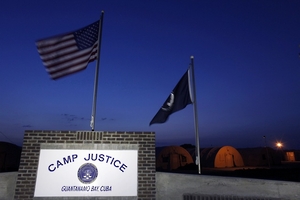US: Military Commission Conviction Overturned
Abandon Guantanamo’s Fatally Flawed Justice System
A United States federal court dealt another blow to the Obama administration’s attempts to resuscitate the inferior military commissions at Guantanamo Bay by overturning the 2008 conviction of Ali Hamza Ahmad Suliman al-Bahlul, Human Rights Watch said on June 12. On June 12, 2015, a US appeals court ruled for the second time that the military commissions unlawfully brought charges for offenses that are not violations of the laws of war. Of the eight convictions imposed by the military commissions, at least four have now been invalidated.

Flags fly above the sign for Camp Justice at Guantanamo Bay.
“The court’s decision should be the final nail in the coffin for the fundamentally flawed military commissions,” said Laura Pitter, senior national security counsel at Human Rights Watch. “Creating an entirely new justice system from scratch was never a good idea. Charging people in a so-called war crimes tribunal with crimes that don’t exist under international law is just one of the system’s many flaws.”
Human Rights Watch has long opposed the use of military commissions at Guantanamo to prosecute people accused of terrorism offenses. The military commissions are mired in excessive secrecy, fail to adequately protect attorney-client privileged communications, and permit the introduction of coerced evidence.
Al-Bahlul was accused of crimes associated with being Osama bin Laden’s “media secretary” and making recruitment videos for Al-Qaeda. He was one of only two detainees convicted in the military commissions whose cases went to full trial, but al-Bahlul refused to put on a defense in protest of the commission’s jurisdiction. Al-Bahlul’s conviction had been upheld by the Court of Military Commission Review, an appeals court created solely to review military commission cases. Its work is reviewed by the federal appeals court in Washington, DC, which issued the latest ruling.
Source: Human Rights Watch
- 301 reads
Human Rights
Ringing FOWPAL’s Peace Bell for the World:Nobel Peace Prize Laureates’ Visions and Actions

Protecting the World’s Cultural Diversity for a Sustainable Future

The Peace Bell Resonates at the 27th Eurasian Economic Summit

Declaration of World Day of the Power of Hope Endorsed by People in 158 Nations

Puppet Show I International Friendship Day 2020

